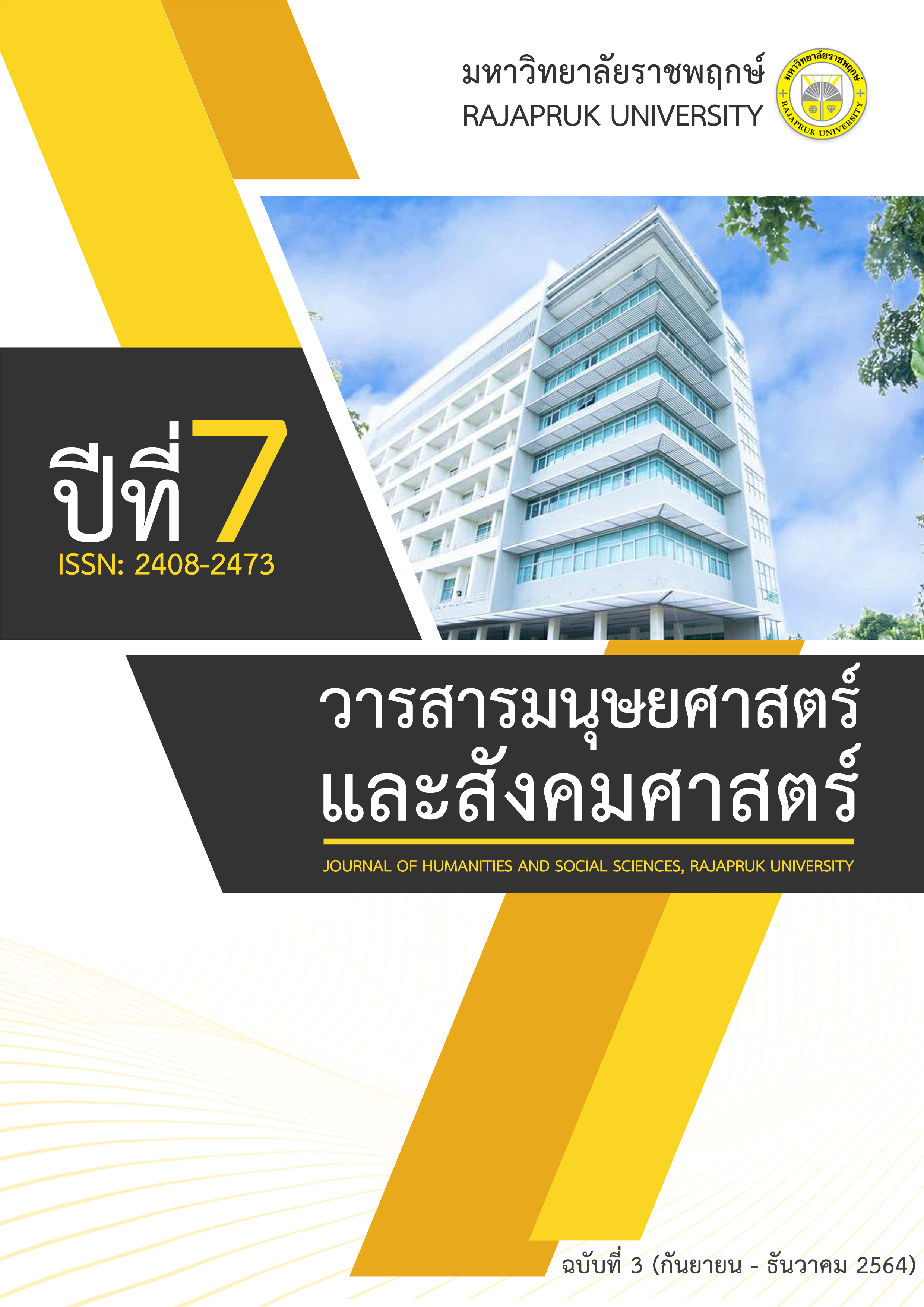The Influence of Organizational Culture on Employees’ Organizational Commitment of Rajamangala University of Technology Suvarnabhumi
Main Article Content
Abstract
The objectives of this research were 1) to study the level of opinion on organizational culture of Rajamangala University of Technology Suvarnabhum personnel, 2) to study the level of opinion on organizational commitment of Rajamangala University of Technology Suvarnabhumi personnel, and 3) to study the organizational culture that influences to the organizational commitment of Rajamangala University of Technology Suvarnabhumi personnel. The population in this research was 1,138 personnel of Rajamangala University of Technology Suvarnabhumi. Using the formula for calculating the sample size of Taro Yamane, the sample size of 296 people was obtained. Using a systematic probability for randomization sampling. A questionnaire with 5-level scale was used as a research tool for data collection. The data were then analyzed by descriptive statistics which were frequency, percentage, mean, and standard deviation and using inferential statistics such as multiple regression analysis for hypothesis testing.
Article Details
References
ณัฐธิดา ชูเจริญพิพัฒน์. (2555). วัฒนธรรมในองค์กรที่มีผลต่อการปฏิบัติงานของพนักงานธนาคารไทยพาณิชย์ เขตนครสวรรค์. ปริญญาบริหารธุรกิจมหาบัณฑิต สาขาวิชาการจัดการทั่วไป มหาวิทยาลัยเทคโนโลยีราชมงคลธัญบุรี.
ไตรภพ เรืองแก้ว. (2559). อิทธิพลของความฉลาดทางอารมณ์และการรับรู้ต่อการสนับสนุนขององค์การที่ส่งผลต่อความผูกพันต่อองค์การของบุคลากรสายสนับสนุนมหาวิทยาลัยเทคโนโลยีราชมงคลพระนคร. วิทยานิพนธ์บริหารธุรกิจมหาบัณฑิต สาขาวิชาการจัดการ มหาวิทยาลัยเทคโนโลยีราชมงคลพระนคร.
ปรัชญา ดาดี. (2557). วัฒนธรรมองค์กรที่ส่งผลต่อความผูกพันต่อองค์กร. การค้นคว้าอิสระบริหารธุรกิจมหาบัณฑิต คณะบริหารธุรกิจ มหาวิทยาลัยเทคโนโลยีราชมงคลอีสาน.
ปัทมา ว่าพัฒนวงศ์ และ ปราโมทย์ ประสาทกุล. (2563). ประชากรไทยในอนาคต. ค้นเมื่อวันที่ 2 มิถุนายน 2563, จาก http://www.ipsr.mahidol.ac.th/IPSR/AnnualConference/ConferenceII/Article/Article02. htm#_ftn2
วณิชยา คินิมาน. (2559). อิทธิพลของวัฒนธรรมองค์กรและธรรมาภิบาลที่มีต่อความผูกพันต่อองค์กรของพนักงานมหาวิทยาลัยสายปฏิบัติการ สำนักงานมหาวิทยาลัยจุฬาลงกรณ์มหาวิทยาลัย. วิทยานิพนธ์บริหารธุรกิจมหาบัณฑิต สาขาวิชาการจัดการ มหาวิทยาลัยเทคโนโลยีราชมงคลพระนคร.
วิชิต อู่อ้น. (2554). การวิจัยและสืบค้นข้อมูลทางธุรกิจ. กรุงเทพฯ: สำนักพิมพ์มหาวิทยาลัยศรีปทุม.
Allen, N. J., & Meyer, J. P. (1990). The measurement and antecedents of affective, continuance, And normative commitment to the organization. Journal of Occupational Psychology, 63(10): 1-18.
Christina, J.-C.D. (2009).Using community-based participatory research in the development of a consumer-driven cultural competency tool. Ph.D. dissertation, School of Nursing, University of Washington.
Cronbach, L. J. (1984). Essentials of Psychological Testing. 4th ed. New York: Harper & Row Publishers.
Daft, Richard L. (2002). The Leadership Experience. 2nd ed. Florida: Harcourt College.
Hair, J. F., Black, B., Babin, B., Anderson, R. E., & Tatha, R. L. (2006). Multivariate Data Analysis. 6th ed. Upper Saddle River, N. J.: Pearson Prentice Hall.
Rovinelli, R. J., & Hambleton, R. K. (1976). On the use of content specialists in the assessment of criterion-referenced test item validity Paper presented at the meeting of AERA. San Francisco.
Shoaib, A. Zainab, N. and Maqsood, H. (2013). Impact of Organizational Culture on Organizational Commitment. Faculty of Management and Human Resource Development. University Teknologi Malaysia.


